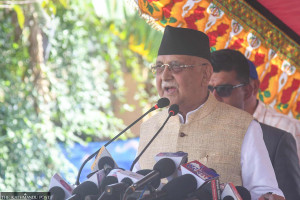Miscellaneous
The beatmaker
On a cold and rainy winter’s day, 19-year-old Sagun Khadka sits at a cafe in Jhamsikhel, listening to hip-hop on his headphones.
Abani Malla
On a cold and rainy winter’s day, 19-year-old Sagun Khadka sits at a cafe in Jhamsikhel, listening to hip-hop on his headphones. If it’s not Kendrick Lamar, Drake or Nas, Sagun is most likely listening to J Cole, the American rapper who shot to fame for his sensitive lyricism and his self-produced beats.
Sagun, who goes by just his first name, listened to J Cole a lot before he discovered that the rapper made his own beats. This sparked something in him and he began to experiment on his own. At just 17 years old, Sagun watched YouTube tutorials and started to make his own hip-hop beats. Since then, Sagun has released three EPs—Height (2017), Vibes and Black (2018) and Yellow Hills (2018)—and has gone on to become the most-streamed Nepali artist on Spotify and his beats have been listened to millions of times on YouTube.
For Sagun, music was a way to deal with a “dark phase” in his own life.
“It was a phase where I had to discover more about myself and what I actually wanted to do in my life,” he says. “Ultimately, I found a new hobby and happiness in creating music. I haven’t stopped experimenting since.”
Hip-hop was a way for Sagun to come to terms with his own inadequacies and confusion. Although a good student in school, he was often at odds with what was expected of him and what he wanted to do on his own. Although not a hip-hop fan during his early teens, he began to gravitate towards this genre of music as his tastes began to mature and he became surer of himself.
“I could relate to the lyrics of the hip-hop community when I was at my worst,” says Sagun. “They were so powerful that they motivated me to make something my own and helped me get out of that [passive] state.”
For Sagun, it was only natural to combine his newfound love of hip-hop with his old interest in technology. As a shy and awkward child, he spent most of his time in his room in Bhaktapur, exploring the internet. He would spend hours trying to create his own webpages using HTML and play games all night till two or three in the morning.
Beat-making requires no real musical instruments. Everything is done digitally, with programmes that can help anyone put together a sequence of musical tones and effects. Although it might sound simple, beat-making requires an ear for sound and sampling, where an older piece of music is ‘sampled’ and incorporated into a new piece of music.
In 2017, Sagun and his friends, Saksham and Sarthak, jointly created the Origami Music Group, through which they would release music.
“We shared a common interest: to make music,” says Sagun. “I would share what I had just created and they would give me constructive feedback.”
In late 2017, Sagun put up his single ‘I’ll keep you safe’ which sampled the elusive and enigmatic musical internet phenomenon Shiloh Dynasty. So far, it was accumulated 47,000 views on his channel, but when it was shared by MoodyTracks, a YouTube channel that features beats from all over the world, the views began to skyrocket. So far, the MoodyTracks upload has received over 17 million views, possibly the highest number of views for any Nepali musical artist.
This track also won Sagun new friends. Joe Kay of the Los Angeles-based record label Soulelection shared his track and he received an email from Prophet, a DJ for Apple’s Beats 1 radio station. Prophet offered him a deal with Platoon, a London-based music distributor that partners with creators to market their work. Platoon, which has now been acquired by Apple, opened up a whole new world for Sagun. His music began to appear on Apple Music and Spotify, where he has over 700,000 monthly listeners. He also began to receive royalties for his music.
“They take 15 percent of my total revenue and I receive the remaining in my bank account on a monthly basis,” says Sagun. Most of his listeners are from the US, UK, Germany, Brazil and Canada. Nepal doesn’t quite figure into that list, as Spotify is not available here.
Sagun, however, is grateful for anyone who listens to his work and is glad to have avoided the limelight so far.
“Not many people here listen to such tracks, and it’s alright,” he says. “Only a few people know about me—even my classmates at college are unaware. My close friends and family know and that’s enough for me. I’m happy to keep a low profile.”
Apart from Shiloh Dynasty, Sagun samples music from the 80s and 90s, in contrast to many producers who reach farther back into the heydays of jazz and blues in the 50s and 60s for their samples. His music, however, is not upbeat; in fact, there’s a whole genre of electronic music that is melancholy—downtempo, along with its derivatives chillwave and vapourwave, which focus on lo-fi, ambient sounds but include a steady beat and samples from the 80s and 90s.
Sagun primarily works on FL Studio, formerly known as FruityLoops, which makes it easy for users to chop music and layer them together on a friendly user interface.
“I listen to the track I’ve just finished creating and then add a title that goes with the vibe,” says Sagun, whose titles too evoke a certain melancholy and sadness.
Sagun now has plans to collaborate with other artists from Platoon and hopefully, someday, make music with his favourites—J Cole and Frank Dukes someday. By the end of February or the first week of March, he will be traveling to London for a few weeks.
“I’m paying a visit to Platoon to meet my distributors and other artists,” he says. “I hope to collaborate with them.”
With supportive parents and a steady income from his music, Sagun, at 19, has the world in front of him. Despite the millions of plays on his YouTube and Spotify, this Bhaktapur teen, however, is content to make his music and avoid the spotlight.
After finishing the coffee he ordered an hour ago, Sagun notices it has stopped raining outside. It’s time for him to leave, so he puts on his hoodie, puts his headphones over his ears and steps out unrecognised.




 16.12°C Kathmandu
16.12°C Kathmandu










